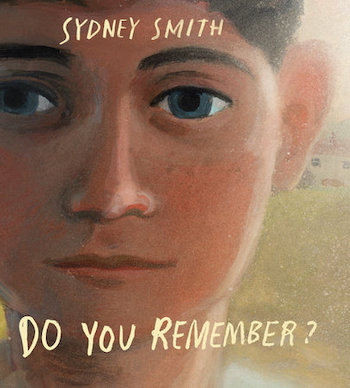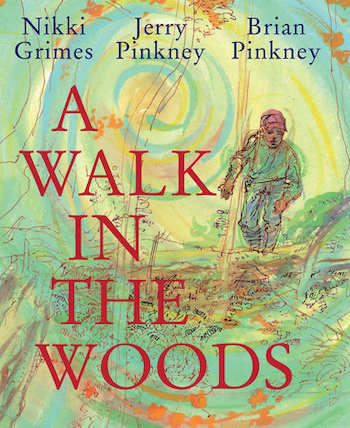Children’s Book Reviews: A Grief Out of Season
By Cyrisse Jaffe
The holidays and their aftermath are not always a time of cheer for families. Two recent children’s books provide empathy and understanding.
Do You Remember? by Sydney Smith. Holiday House, 2023.
A Walk in the Woods by Nikki Grimes. Illustrated by Jerry Pinkney and Brian Pinkney. Holiday House, 2023.
 A recent death, a parent in prison, divorce, deployment, or other difficult events are even more painful for some folks during a time when the world seems to be full of celebrations, cozy togetherness, and laughter. Movies and television shows — and most children’s books — focus, understandably, on the brighter side of the season. The adults in a child’s life may not want to dwell on loss, especially during the holidays. Yet acknowledging the absence of a loved one by talking and remembering them may mediate, rather than increase, sadness.
A recent death, a parent in prison, divorce, deployment, or other difficult events are even more painful for some folks during a time when the world seems to be full of celebrations, cozy togetherness, and laughter. Movies and television shows — and most children’s books — focus, understandably, on the brighter side of the season. The adults in a child’s life may not want to dwell on loss, especially during the holidays. Yet acknowledging the absence of a loved one by talking and remembering them may mediate, rather than increase, sadness.
In Sydney Smith’s Do You Remember?, a mother and son reminisce about happier times with dad, who is gone for unspecified reasons. They take turns recalling past moments — a picnic with sweet berries, a bicycle ride that ended in a safe tumble, a rainstorm when the little boy was almost lost but then found. Now, settling into a new place in the city (the father is shown waving goodbye), they must adjust to a new environment and a new reality.
The little boy, wise beyond his years, goes to open a window and suggests to his mother that this, too, can become a good memory. “We could say,” he tells her, ‘Do you remember the first morning in our new home? It was just you and me. We could hear the buses rumbling…. And the sun was coming up over the city. It was like magic.’” The mother agrees. We, as readers, are left both wistful and optimistic.
The power of the book lies both in its spare narrative and in the dreamy watercolors, done with muted colors and impressionistic imagery. The scenes between mother and son are intimate and dimly lit, with them facing each other, snuggled up. The bleakness of the predawn day gives way to a slow influx of light (visible in the earlier pictures), as the sun breaks through. The two-person family, along with the city, has woken up to a new perspective. It’s a lovely and thoughtful message, beautifully delivered.
A Walk in the Woods is more specific in some ways but also a little harder to decode. It’s a week after his father’s funeral and his son is angry and confused. He opens an envelope left to him by his dad and it’s a treasure map, not a hoped-for letter of advice or information. The boy follows the map into the woods beyond his house near the Hudson River, passing forest animals — snake, bird, eagle, grouse — along with mushrooms, and hickory, beech, and black oak trees “that go on forever.” It’s a special place that the boy shared with his father and, gradually, he feels better: “And with each step, the hurt inside my heart pounds less, and less.” But it’s not until he finds the remains of a house that he discovers the treasure: a rusted metal box. He opens it to find his father’s sketches and poems about the familiar wildlife, done when his father was the age the boy is now. There’s a message, too: “I leave you these drawings, these scribbles, and mostly this forest — the true treasure…. this last [blank] page is for you, Son. Draw and write your own story. I’ll always be watching.” It is this reassurance that helps the boy mourn but also begin to recover from the trauma of losing his father.
 The participation of Grimes and the two Pinkneys (father and son) makes this an important book. Each has contributed greatly to children’s literature over the past decades. Nikki Grimes is an African American poet, journalist, and writer of many wonderful books for children and young adults. She won the Coretta Scott King Award in 2002 for her novel Bronx Masquerade. In 2017, she was given the Wilder Award, which “honors an author or illustrator whose books, published in the United States, have made, over a period of years, a substantial and lasting contribution to the literature for children.”
The participation of Grimes and the two Pinkneys (father and son) makes this an important book. Each has contributed greatly to children’s literature over the past decades. Nikki Grimes is an African American poet, journalist, and writer of many wonderful books for children and young adults. She won the Coretta Scott King Award in 2002 for her novel Bronx Masquerade. In 2017, she was given the Wilder Award, which “honors an author or illustrator whose books, published in the United States, have made, over a period of years, a substantial and lasting contribution to the literature for children.”
Jerry Pinkney is a towering figure in children’s books. Many of his volumes focus on African American folklore and biographies, including Julius Lester’s John Henry, which won the Boston Globe Horn Book Award in 1994. In 2009, he was the first African American to win the Caldecott Medal, for his version of The Lion and the Mouse. He won the Coretta Scott King-Virginia Hamilton Award for Lifetime Achievement in 2016. His son, Brian, is an award-winning illustrator in his own right. With his wife, Andrea Davis Pinkney, Brian has published over 70 children’s books. Like his father, he has won many awards, including the Boston Globe Horn Book Award in 1997 and the Coretta Scott King Illustrator Award in 2000.
Nikki Grimes and Jerry Pinkney recognized that children’s books showing African American characters “engaging with nature,” were rare, and set out to create one. When Jerry died suddenly in 2021, he left behind the sketches for A Walk in the Woods. Brian was asked, just weeks after his father’s passing, to add his father’s characteristic watercolors to the illustration. The irony of finishing the illustrations for a book about a boy who has lost his father, with a message to carry on the father’s legacy, was not lost on Brian. “The experience,” he explains in an author/illustrator note, “can only be described as mysterious and magical.” A third family member, Jerry’s granddaughter Charnelle Pinkney Barlow, used computer tools to meld Brian’s swirling color paintings with Jerry’s sketches.
A Walk in the Woods has received rave reviews and may win awards. Yet one wonders if its backstory is more moving than the book itself. Children may find the narrative, lyrical as it is, confusing. Why did the boy’s father “hide” the pictures rather than openly sharing them with his son? Could just one walk in the woods really bring that much healing? The sketches themselves often look like artist studies rather than finished illustrations. The father’s sketches look the same as the book’s illustrations, which may make it hard for kids to follow the shift in the story. However, many readers may excuse these quibbles and decide that the encouraging message — those who are lost are always with us — outweighs the book’s flaws.
Cyrisse Jaffee is a former children’s and YA librarian, children’s book editor, and a creator of educational materials for WGBH. She holds a master’s degree in Library Science from Simmons College and lives in Newton, MA.
Tagged: "A Walk in the Woods", "Do You Remember", Brian Pinkney, Jerry Pinkney, Nikki Grimes, grief, loss
